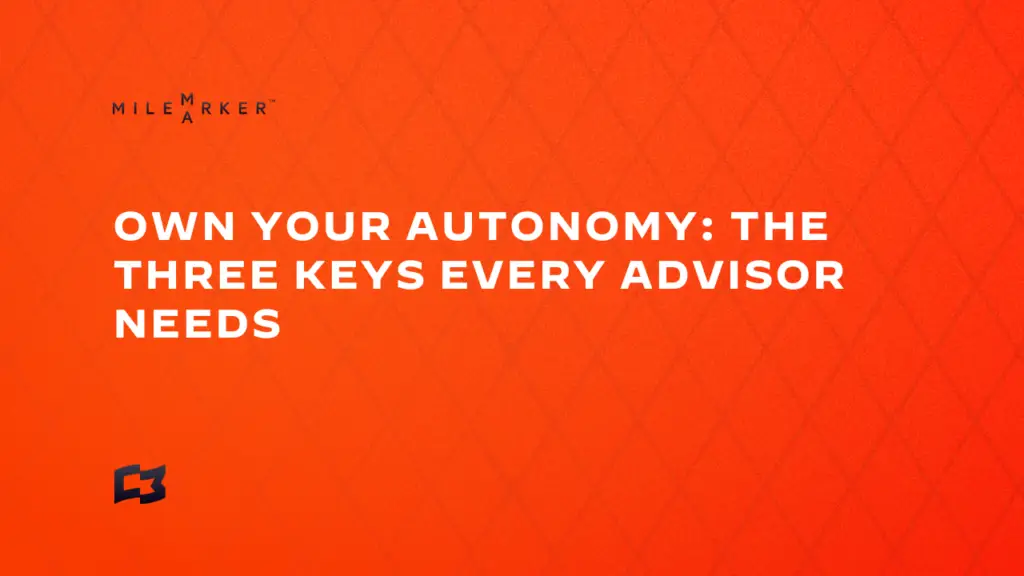“When you help others secure their future, don’t neglect your own.”
Advisors spend hours every day guiding others toward financial independence. But when was the last time you paused to evaluate your own sense of autonomy, competence, and relatedness?
Self-Determination Theory, established by Edward Deci and Richard Ryan, highlights three elements that drive human motivation and well-being:
1. Autonomy – The freedom to choose.
2. Competence – Confidence in your abilities.
3. Relatedness – Meaningful connections with others.
You likely coach your clients on these principles regularly, but does your practice embody them?
Autonomy: Are You Truly in Control?
Your autonomy isn’t just about freedom—it’s about control over your future.
– Could your business survive the sudden loss of a major vendor?
– If your custodian stopped its referral program tomorrow, would your growth stall dramatically?
– If you lost one of your top advisors, would your business take a major hit?
Quick action:
1. Identify your critical dependencies today.
2. Outline contingency plans for at least two key vendors or referral sources.
Competence: Can Your Practice Run Without You?
True competence means your business thrives even when you’re not in the room.
– Do your processes live in your head, or are they documented?
– Would your profit margins withstand a significant market downturn?
– Is your business over-indexed on your output?
Quick action:
Calculate your trailing 12-month EBITDA margin, revenue per team member, and technology spending as a percentage of revenue. You can even go a step further and break this down across your clients segments, advisors or advisory agreements.
Unsure where to start? Milemarker can help you see and work with this kind of data with ease.
Relatedness: Who’s in Your Corner?
Success is rarely a solo sport.
– Do you have a supportive network, or are you isolated?
– Are your partnerships enhancing or diminishing your autonomy and competence?
I work with many exceptional advisory firms that offer highly flexible partnership models. They provide a perfect balance—maintaining your autonomy while offering the scale, processes, and community you need to thrive. If you’d like introductions or guidance on finding the right fit, let me know.
Quick action: Identify three people or organizations that could significantly improve your competence without compromising your autonomy. Reach out and start one meaningful conversation this month.
A Clear Five-Minute Checkup
Take five minutes to evaluate your practice honestly:
Step 1: Rate each area below from 1 (weak) to 10 (strong).
| Area | Your Score (1-10) |
| Autonomy (control and freedom) | |
| Competence (confidence in your systems and processes) | |
| Relatedness (supportive networks and partnerships) |
Step 2: Clearly note why you chose that score:
– Autonomy:
– Competence:
– Relatedness:
Step 3: Pick the lowest-scoring area. Identify one specific step you can take immediately to improve it:
– First improvement step:
Lowest score = your highest priority. Address this first.
Why This Matters
– Succession planning: Clear data and structured processes directly boost your firm’s value.
– Market resilience: Firms with strong autonomy and competence are better positioned to adapt to regulatory and technological changes.
– Next-generation appeal: Talented advisors and affluent clients choose firms that offer clarity, stability, and meaningful community.
Mastering these three areas puts you in control of your narrative and future.
Your Challenge
Pick your lowest-scoring area, define one immediate action, and commit to taking that step within the next seven days.
Reply and let me know what you’ll be working on. I’ll anonymously share some of the most insightful approaches in the next issue.
Need immediate clarity? Milemarker specializes in delivering actionable insights and firm metrics—quickly and clearly.

